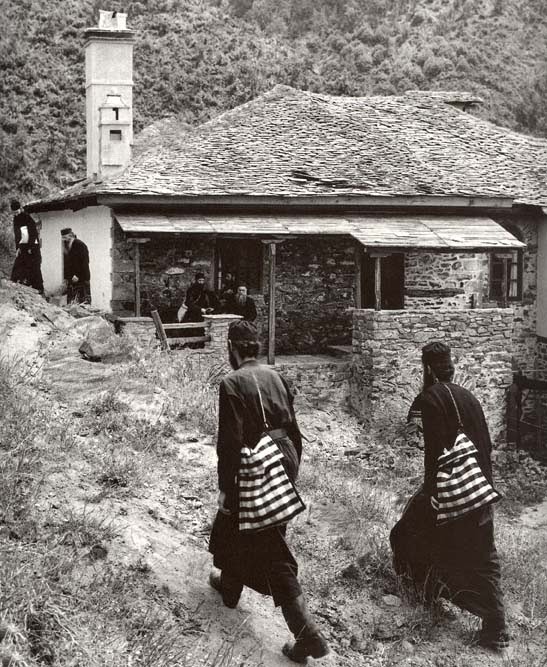
Στην ακολουθία του Όρθρου ψάλεται ο Πολυέλαιος «Δούλοι Κύριον» έρρυθμα για να ταιριάζει η ψαλμωδία με την κίνηση του κατζίου,του θυμιατού με το οποίο θυμιάζουν οι μοναχοί που έχουν το διακόνημα του εκκλησιαστικού.
Το κατζίο είναι φορητό και χρησιμοποιείται στις λατρευτικές συνάξεις εντός του ναού όταν ψάλλονται ύμνοι από την Παλαιά Διαθήκη ή αναγινώσκονται οι Μεγάλες Ώρες. Είναι μεταλλικό με μακριά χειρολαβή και κουδούνια, τα οποία συμβολίζουν τα βήματα του Θεού στον Παράδεισο και προτρέπουν τους μοναχούς σε εγρήγορση :”’Και άκουσαν τη φωνή του Κυρίου του Θεού, να περπατάει στον παράδεισο προς το δειλινό” (Παλαιά Διαθήκη Γένεση Κεφ. 3, Στίχος 8..
Όταν οι εκκλησιαστικοί θυμιάζουν με το κατζίο φέρουν στον ώμο τους ένα τετράγωνο ύφασμα που λέγεται ”αήρ” ΄ συνήθως είναι χρυσοποίκιλτο και δηλώνει το αγγελικό τάγμα που εξέπεσε από τη πατρώα δόξα και που αντικαταστάθηκε από τους μοναχούς. Ο εκκλησιαστικός λοιπόν κρατά το κατζίο με το ”χειρομανδήλιον”, το οποίο είναι μικρότερο από τον ”αέρα”. Ο συμβολισμός του απορρέει από την απάντηση του Αναστημένου Κυρίου ”μη μου άπτου” (μην με αγγίζεις), στην Μαρία την μυροφόρο, όταν αυτή από την χαρά της ήθελε να Τον αγγίξει. (Κατά Ιωάννη Κεφ. 20, Στίχος 17..)
Επειδή το θυμιατήριο συμβολίζει τις δύο φύσεις, ανθρώπινη και θεϊκή, και τις τρείς υποστάσεις Πατήρ, Υιός και Άγιο Πνεύμα και επειδή ο εκκλησιαστικός δεν έχει ιεροσύνη, πιάνει το κατζίο με το ”χειρομάνδηλο” από ευλάβεια και σεμνότητα.
http://www.pemptousia
There was a virtuous hermit who frequently prayed to God, and who received revelations of many divine mysteries. One day he set out from his hermitage to travel to a distant region. Along the way, he met another man who was journeying in the same direction. This individual was actually an angel, but the hermit did not realize this and assumed he was a regular human being.
As they journeyed together, along the path they
encountered a dead horse. The hermit covered his nose and held his breath; the angel did not. A short while later, they came across a dead calf. The hermit again covered his nose and held his breath; the angel did not. Not long after, they found a dead dog in their path. The hermit covered his nose and held his breath; the angel did nothing.
Eventually they approached a certain village
where they crossed paths with a beautiful young lady, who was wearing extravagant clothing and
ornate jewelry, and taking great pride in her appearance.
The angel then immediately covered his nose. When the hermit witnessed this, he stopped and
asked, “Who are you? Are you an angel, a human being, or a demon? ...
We passed by a dead horse that stunk, but you did not cover your nose. We also passed by the dead calf and dog, and I did not see you cover your nose. Now that we passed by such a beautiful young lady you decided to cover your nose and hold your breath?” Then the angel made himself visible to the hermit and replied, “Nothing smells as bad as pride does to God.” Having said this, the angel disappeared.
The hermit then returned back to his hut and
began weeping for his sins, beseeching God
to protect him henceforth from the devil’s traps, and not allow him to fall into the sin of pride and
thus losehis soul.
St. Kosmas Aitolos

